How Bitcoin Mining Works
With Bitcoin, miners use special software to solve math problems and
are issued a certain number of bitcoins in exchange. This provides a
smart way to issue the currency and also creates an incentive for more
people to mine.
Bitcoin is Secure
Links
- We Use Coins - Learn all about crypto-currency.
- Bitcoin News - Where the Bitcoin community gets news.
- Bitcoin Knowledge Podcast - Interviews with top people in Bitcoin
Bitcoin Mining Hardware Comparison
Currently, based on (1) price per hash and (2) electrical efficiency the best Bitcoin miner options are:
- Overview - Table of Contents
- Mining Hardware Comparison
- What is Bitcoin Mining?
- What is the Blockchain?
- What is Proof of Work?
- What is Bitcoin Mining Difficulty?
- The Computationally-Difficult Problem
- The Bitcoin Network Difficulty Metric
- The Block Reward
Bitcoin mining is the process of adding transaction records to Bitcoin's public ledger of past transactions or blockchain.
This ledger of past transactions is called the block chain as it is a
chain of blocks. The block chain serves to confirm transactions to the
rest of the network as having taken place.
Bitcoin nodes use the block chain to distinguish legitimate Bitcoin transactions from attempts to re-spend coins that have already been spent elsewhere.
What is Bitcoin Mining?
What is the Blockchain?
Bitcoin mining is
intentionally designed to be resource-intensive and difficult so that
the number of blocks found each day by miners remains steady. Individual
blocks must contain a proof of work to be considered valid. This proof
of work is verified by other Bitcoin nodes each time they receive a
block. Bitcoin uses the hashcash proof-of-work function.
The primary purpose of mining is to allow Bitcoin nodes to reach a
secure, tamper-resistant consensus. Mining is also the mechanism used
to introduce Bitcoins into the system: Miners are paid any transaction
fees as well as a "subsidy" of newly created coins.
This both serves the purpose of disseminating new coins in a
decentralized manner as well as motivating people to provide security
for the system.
Bitcoin mining is so called because it resembles the mining of
other commodities: it requires exertion and it slowly makes new currency
available at a rate that resembles the rate at which commodities like
gold are mined from the ground.
What is Proof of Work?
A proof of work
is a piece of data which was difficult (costly, time-consuming) to
produce so as to satisfy certain requirements. It must be trivial to
check whether data satisfies said requirements.
Producing a proof of work can be a random process with low
probability, so that a lot of trial and error is required on average
before a valid proof of work is generated. Bitcoin uses the Hashcash
proof of work.
What is Bitcoin Mining Difficulty?
The Computationally-Difficult Problem
Bitcoin mining a block is difficult because the SHA-256 hash of a
block's header must be lower than or equal to the target in order for
the block to be accepted by the network.
This problem can be simplified for explanation purposes: The hash
of a block must start with a certain number of zeros. The probability
of calculating a hash that starts with many zeros is very low, therefore
many attempts must be made. In order to generate a new hash each round,
a nonce is incremented. See Proof of work for more information.
The Bitcoin Network Difficulty Metric
The Bitcoin mining network difficulty
is the measure of how difficult it is to find a new block compared to
the easiest it can ever be. It is recalculated every 2016 blocks to a
value such that the previous 2016 blocks would have been generated in
exactly two weeks had everyone been mining at this difficulty. This will
yield, on average, one block every ten minutes.
As more miners join, the rate of block creation will go up. As
the rate of block generation goes up, the difficulty rises to compensate
which will push the rate of block creation back down. Any blocks
released by malicious miners that do not meet the required difficulty
target will simply be rejected by everyone on the network and thus will
be worthless.
The Block Reward
When a block is discovered, the discoverer may award themselves a
certain number of bitcoins, which is agreed-upon by everyone in the
network. Currently this bounty is 25 bitcoins; this value will halve
every 210,000 blocks. See Controlled Currency Supply.
Additionally, the miner is awarded the fees paid by users sending
transactions. The fee is an incentive for the miner to include the
transaction in their block. In the future, as the number of new bitcoins
miners are allowed to create in each block dwindles, the fees will make
up a much more important percentage of mining income.

 To begin mining bitcoins,
you'll need to acquire bitcoin mining hardware. In the early days of
bitcoin, it was possible to mine with your computer CPU or high speed
video processor card. Today that's no longer possible. Custom Bitcoin
ASIC chips offer performance up to 100x the capability of older systems
have come to dominate the Bitcoin mining industry.
To begin mining bitcoins,
you'll need to acquire bitcoin mining hardware. In the early days of
bitcoin, it was possible to mine with your computer CPU or high speed
video processor card. Today that's no longer possible. Custom Bitcoin
ASIC chips offer performance up to 100x the capability of older systems
have come to dominate the Bitcoin mining industry.

The software delivers the work to the miners and receives the completed work from the miners and relays that information back to the blockchain and your mining pool. The best Bitcoin mining software can run on almost any operating system, such as OSX, Windows, Linux, and has even been ported to work on a Raspberry Pi with some modifications for drivers depending on your mining setup.
Not only does the Bitcoin mining software relay the input and output of your Bitcoin miners to the blockchain, but it also monitors them and displays general statistics such as the temperature, hashrate, fan speed, and average speed of the Bitcoin miner.
There are a few different types of Bitcoin mining software out there and each have their own advantages and disadvantages, so be sure to read up on the various mining software out there.
 If you solo-mine, meaning you do not mine with a Bitcoin mining pool, then you will need to ensure that you are in consensus with the Bitcoin network. The best way is to use the official BitCore client.
If you solo-mine, meaning you do not mine with a Bitcoin mining pool, then you will need to ensure that you are in consensus with the Bitcoin network. The best way is to use the official BitCore client.
If you participate in a Bitcoin mining pool then you will want to ensure that they are engaging in behavior that is in agreement with your philosophy towards Bitcoin.
How much bandwidth does Bitcoin mining take? If you are mining with a pool then the amount should be negligible with about 10MB/day. However, what you do need is exceptional connectivity so that you get any updates on the work as fast as possible.
For example, some rogue developers have threatened to release software that could hard-fork the network which would likely result in tremendous financial damage.
Therefore, it is your duty to make sure that any Bitcoin mining power you direct to a mining pool does not attempt to enforce network consensus rules you disagree with.
But once you earn them then where do you keep them safe and secure? For a Bitcoin wallet we highly recommend using one where you hold your own private keys in contrast to to a hosted wallet like Coinbase or Circle.
Once mined Bitcoin becomes like a currency that can be purchased, used in transactions or even traded like with this Bitcoin trading platform.
For this we recommend:
Okay, so the first thing that you need to do before you could start Bitcoin mining is to sign up for a Bitcoin wallet. Now there’s a lot of wallets that you could choose from but I prefer Circle. Now let’s head over and set up an account. All you have to do is enter in your email and choose a password.
Once you log in to your account you will see a summary of your Bitcoin balance and transactions. But before you can receive any Bitcoins you need to set up a Bitcoin address. You could do so by clicking account settings.
Once you are on the account settings page go ahead and click Bitcoin Addresses. From there click Create New Address. This generates a long string of numbers and letters. This is the address that we will need to enter into our mining pool. So let's take a look at that now.
There are many mining pools that you can choose from, but I prefer BitMinter as my primary pool and Slush’s pool as my backup. Just create an account whichever one you choose and log in. Your account details page will normally have an auto cash out option.
This is where we will enter in our wallet address that we created earlier. When you have mined enough Bitcoins to meet the threshold it would automatically be transferred to your Bitcoin wallet.
Next, go up top to the My Account drop down and select Workers. This worker information is what you need to input into the mining software so that you get credit for the work that is done. You do not need to secure this information with a difficult username or password because anyone that uses this information will be giving you credit.
Now let's take a look at setting up the mining software. As mentioned in Part 1 of the series we'll be using the MinePeon operating system. This can be downloaded from sourceforge.net.
Now this is the image that we will need to write onto our SD card. Another software that we need to download is called the Win32 Disk Imager. This can also be found on sourceforge.net. This is the software that we will use to write the MinePeon image onto our SD card.
Once you have downloaded both files insert your SD card into your computer. Then open up Win32 Disk Imager. Simply select the location of your MinePeon image then select the correct drive for your SD card. All you have to do now is click write. This will write the MinePeon image on to your SD card. Insert the SD card into your Raspberry Pi as shown on Part 1 of the series then power up the unit.
Now sign in to MinePeon by typing in the network IP address into your browser. The easiest way to find this IP address is by logging in to your router and looking for the device called MinePeon. You will then be prompted to enter in your MinePeon's username and password. The default setting for this is MinePeon for the username, peon for the password. You will see a security warning but do not be alarmed. This is perfectly normal so proceed anyways. You will then be asked to re-enter the username and password.
So again, MinePeon is the username peon is the password. You are now finally in MinePeon's dashboard. This is where you can monitor the performance of your mining rig. Head up top and click pools. This page allows you to set up your mining pools. As you can see I have BitMinter as my primary pool and Slush’s pool as my secondary. Just enter in the URL of your mining pool, the username and password if you have one.
Then go ahead and submit your settings. You may need to reboot MinePeon after any changes. Great job every one. You are now officially mining for Bitcoins.
All right, so that should be everything that you need to start Bitcoin mining.
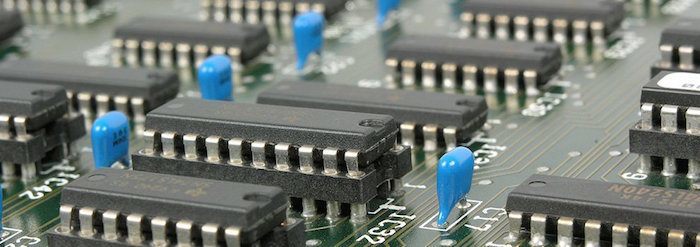
 At first, miners used their central processing unit
(CPU) to mine, but soon this wasn't fast enough and it bogged down the
system resources of the host computer. Miners quickly moved on to using
the graphical processing unit (GPU) in computer
graphics cards because they were able to hash data 50 to 100 times
faster and consumed much less power per unit of work.
At first, miners used their central processing unit
(CPU) to mine, but soon this wasn't fast enough and it bogged down the
system resources of the host computer. Miners quickly moved on to using
the graphical processing unit (GPU) in computer
graphics cards because they were able to hash data 50 to 100 times
faster and consumed much less power per unit of work.
During the winter of 2011, a new industry sprang up with custom equipment that pushed the performance standards even higher. The first wave of these specialty bitcoin mining devices were easy to use Bitcoin miners were based on field-programmable gate array (FPGA) processors and attached to computers using a convenient USB connection.
FPGA miners used much less power than CPU's or GPU's and made concentrated mining farms possible for the first time.
For a comprehensive comparison of bitcoin mining hardware.
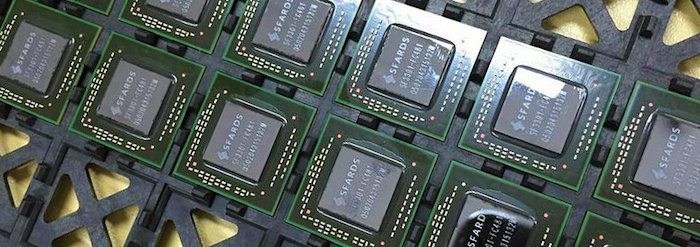 Two major factors go into determining the best bitcoin mining hardware: (1) cost and (2) electricity efficiency.
Two major factors go into determining the best bitcoin mining hardware: (1) cost and (2) electricity efficiency.
Bitcoin mining is difficult to do profitably but if you try then this Bitcoin miner is probably a good shot.
As Bitcoin mining increases in popularity and the Bitcoin price rises so does the value of ASIC Bitcoin mining hardware. As more Bitcoin mining hardware is deployed to secure the Bitcoin network the Bitcoin difficulty rises. This makes it impossible to profitably compete without a Bitcoin ASIC system. Furthermore, Bitcoin ASIC technology keeps getting faster, more efficient and more productive so it keeps pushing the limits of what makes the best Bitcoin mining hardware.
Some models of Bitcoin miners include Antminer S5, Antminer U3, ASICMiner BE Tube, ASICMiner BE Prisma, Avalon 2, Avalon 3, BTC Garden AM-V1 616 GH/s, VMC PLATINUM 6 MODULE, and USB miners.
 For those not interested in operating the actual hardware then they
can purchase Bitcoin cloud mining contracts. Being listed in this
section is NOT an endorsement of these services. There have been a
tremendous amount of Bitcoin cloud mining scams.
For those not interested in operating the actual hardware then they
can purchase Bitcoin cloud mining contracts. Being listed in this
section is NOT an endorsement of these services. There have been a
tremendous amount of Bitcoin cloud mining scams.
Ref:https://www.bitcoinmining.com/
Bitcoin Mining Guide - Getting started with Bitcoin mining
- Overview - Table of Contents
- How Bitcoin Mining Works
- Get The Best Bitcoin Mining Hardware
- How To Start Bitcoin Mining
- Bitcoin Cloud Mining Contracts
- Hardware Comparison
- Download Bitcoin Mining Software
- Join a Bitcoin Mining Pool
- Set Up A Bitcoin Wallet
- Bitcoin News
- Other Languages
You will learn (1) how bitcoin mining works, (2) how to start mining bitcoins, (3) what the best bitcoin mining software is, (4) what the best bitcoin mining hardware is, (5) where to find the best bitcoin mining pools and (6) how to optimize your bitcoin earnings.
Bitcoin mining is difficult to do profitably but if you try then this Bitcoin miner is probably a good shot.
..........
How Bitcoin Mining Works?
Before you start mining Bitcoin, it's useful to understand what
Bitcoin mining really means. Bitcoin mining is legal and is accomplished
by running SHA256 double round hash verification processes in order to
validate Bitcoin transactions and provide the requisite security for the
public ledger of the Bitcoin network. The speed at which you mine
Bitcoins is measured in hashes per second.
The Bitcoin network compensates Bitcoin miners for their effort
by releasing bitcoin to those who contribute the needed computational
power. This comes in the form of both newly issued bitcoins and from the
transaction fees included in the transactions validated when mining
bitcoins. The more computing power you contribute then the greater your
share of the reward.
Step 1 - Get The Best Bitcoin Mining Hardware
Purchasing Bitcoins - In some cases, you may need to purchase mining hardware with bitcoins. Today, you can purchase most hardware on Amazon. You also may want to check the bitcoin charts.
How To Start Bitcoin Mining
Bitcoin mining with anything less will consume more in
electricity than you are likely to earn. It's essential to mine bitcoins
with the best bitcoin mining hardware built specifically for that
purpose. Several companies such as Avalon offer excellent systems built
specifically for bitcoin mining.
Best Bitcoin Cloud Mining Services
Another option is to purchase in Bitcoin cloud mining contracts. This
greatly simplifies the process but increases risk because you do not
control the actual physical hardware.
 Being listed in this section is NOT an endorsement of these
services. There have been a tremendous amount of Bitcoin cloud mining
scams.
Being listed in this section is NOT an endorsement of these
services. There have been a tremendous amount of Bitcoin cloud mining
scams.
Hashflare Review: Hashflare
offers SHA-256 mining contracts and more profitable SHA-256 coins can
be mined while automatic payouts are still in BTC. Customers must
purchase at least 10 GH/s.
Genesis Mining Review: Genesis
Mining is the largest Bitcoin and scrypt cloud mining provider. Genesis
Mining offers three Bitcoin cloud mining plans that are reasonably
priced. Zcash mining contracts are also available.
Hashing 24 Review: Hashing24
has been involved with Bitcoin mining since 2012. They have facilities
in Iceland and Georgia. They use modern ASIC chips from BitFury deliver
the maximum performance and efficiency possible.
Minex Review: Minex
is an innovative aggregator of blockchain projects presented in an
economic simulation game format. Users purchase Cloudpacks which can
then be used to build an index from pre-picked sets of cloud mining
farms, lotteries, casinos, real-world markets and much more.
Minergate Review: Offers both pool and merged mining and cloud mining services for Bitcoin.
Hashnest Review: Hashnest
is operated by Bitmain, the producer of the Antminer line of Bitcoin
miners. HashNest currently has over 600 Antminer S7s for rent. You can
view the most up-to-date pricing and availability on Hashnest's website.
At the time of writing one Antminer S7's hash rate can be rented for
$1,200.
Bitcoin Cloud Mining Review: Currently all Bitcoin Cloud Mining contracts are sold out.
NiceHash Review: NiceHash is unique in that it uses an orderbook
to match mining contract buyers and sellers. Check its website for
up-to-date prices.
Eobot Review: Start cloud mining Bitcoin with as little as $10. Eobot claims customers can break even in 14 months.
MineOnCloud Review: MineOnCloud currently has about 35 TH/s of
mining equipment for rent in the cloud. Some miners available for rent
include AntMiner S4s and S5s.

If you prefer the ease of use that comes with a GUI, you might want to try EasyMiner which is a click and go windows/Linux/Android program.
You may want to learn more detailed information on the best bitcoin mining software.

For a fully decentralized pool, we highly recommend p2pool.
The following pools are believed to be currently fully validating blocks with Bitcoin Core 0.9.5 or later (0.10.2 or later recommended due to DoS vulnerabilities):

Bitcoins are sent to your Bitcoin wallet by using a unique address that only belongs to you. The most important step in setting up your Bitcoin wallet is securing it from potential threats by enabling two-factor authentication or keeping it on an offline computer that doesn't have access to the Internet. Wallets can be obtained by downloading a software client to your computer.
For help in choosing a Bitcoin wallet then you can get started here.
You will also need to be able to buy and sell your Bitcoins. For this we recommend:
There is the Bitcoin Mining News Section and these are the 5 most recent articles:
Read the ten most recent Bitcoin Mining news articles, review the Archives or for general Bitcoin news visit WeUseCoins News.
Bitcoin mining pools are a way for Bitcoin miners to pool their resources together and share their hashing power while splitting the reward equally according to the amount of shares they contributed to solving a block.
A "share" is awarded to members of the Bitcoin mining pool who present a valid proof of work that their Bitcoin miner solved. Bitcoin mining in pools began when the difficulty for mining increased to the point where it could take years for slower miners to generate a block.
The solution to this problem was for miners to pool their resources so they could generate blocks quicker and therefore receive a portion of the Bitcoin block reward on a consistent basis, rather than randomly once every few years.

If you solo-mine, meaning you do not mine with a Bitcoin mining pool,
then you will need to ensure that you are in consensus with the Bitcoin
network. The best way is to use the official BitCore client.
If you participate in a Bitcoin mining pool then you will want to ensure that they are engaging in behavior that is in agreement with your philosophy towards Bitcoin.
For example, some rogue developers have threatened to release software that could hard-fork the network which would likely result in tremendous financial damage.
Therefore, it is your duty to make sure that any Bitcoin mining power you direct to a mining pool does not attempt to enforce network consensus rules you disagree with.
Segwit is already activated and enforced on testnet, so you may find it useful to test your infrastructure upgrade by mining with some small amount of hashrate on testnet. Alternatively, Bitcoin Core 0.13.1’s regression test mode (regtest) also supports segwit by default.
The hash rate distribution is best when split among more Bitcoin mining pools.
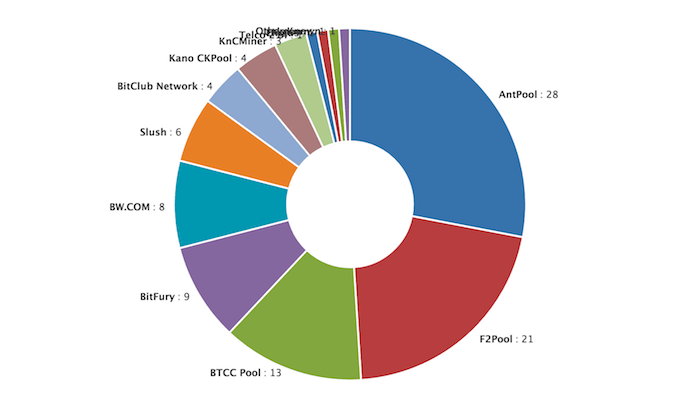
The following pools are believed to be currently fully validating blocks with Bitcoin Core 0.11 or later:
 BTCC: BTCC is a Bitcoin
exchange, wallet, and mining pool located in China. Its mining pool
currently controls around 15% of the network hash rate.
BTCC: BTCC is a Bitcoin
exchange, wallet, and mining pool located in China. Its mining pool
currently controls around 15% of the network hash rate.
 Slush Pool: Slush Pool is run by Satoshi Labs,
a Bitcoin company based in the Czech Republic. Slush Pool was the first
mining pool and maintains around 7% of the network hash rate.
Slush Pool: Slush Pool is run by Satoshi Labs,
a Bitcoin company based in the Czech Republic. Slush Pool was the first
mining pool and maintains around 7% of the network hash rate.
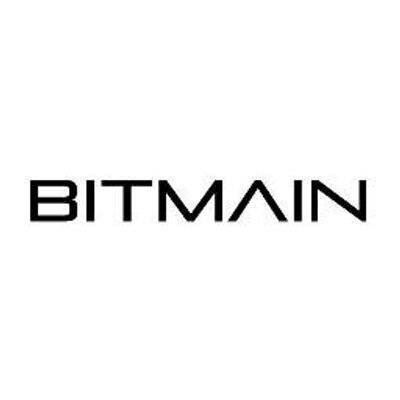 Antpool: [WARNING] - Bitmain operates Antpool and some consider them to be a malicious actor in the Bitcoin ecosystem because of the AntBleed scandal where they were intentionally including malware within mining equipment they sell. In a corporate communication,
Bitmain claimed this was a feature and not a bug. This malware would
enable Bitmain to remotely shut down equipment of customers or
competitors thus increasing their own profitability. Additionally, such
behavior could pose a risk to the entire Bitcoin network.
Antpool: [WARNING] - Bitmain operates Antpool and some consider them to be a malicious actor in the Bitcoin ecosystem because of the AntBleed scandal where they were intentionally including malware within mining equipment they sell. In a corporate communication,
Bitmain claimed this was a feature and not a bug. This malware would
enable Bitmain to remotely shut down equipment of customers or
competitors thus increasing their own profitability. Additionally, such
behavior could pose a risk to the entire Bitcoin network.
 Eligius: Eligius was one of the first Bitcoin mining pools and was founded by Luke Dashjr, a Bitcoin Core developer. Today, the pool controls just under 1% of the network hash rate.
Eligius: Eligius was one of the first Bitcoin mining pools and was founded by Luke Dashjr, a Bitcoin Core developer. Today, the pool controls just under 1% of the network hash rate.
 BitMinter: BitMinter, once one of the largest Bitcoin mining pools, now controls less than 1% of the network hash rate.
BitMinter: BitMinter, once one of the largest Bitcoin mining pools, now controls less than 1% of the network hash rate.
 Kano CKPool: Kano CKPool was founded in 2014 and currently has around 3% of the network hash rate under its control.
Kano CKPool: Kano CKPool was founded in 2014 and currently has around 3% of the network hash rate under its control.
 F2Pool: F2Pool is the
second largest Bitcoin mining pool, with around 25% of the network hash
rate. Its user interface is in Chinese, making it difficult for English
speakers to join.
F2Pool: F2Pool is the
second largest Bitcoin mining pool, with around 25% of the network hash
rate. Its user interface is in Chinese, making it difficult for English
speakers to join.
 BW Pool: BW Pool controls
around 7% of the network hash rate. Like F2Pool, its user interface is
in Chinese, making it difficult for English speakers to join.
BW Pool: BW Pool controls
around 7% of the network hash rate. Like F2Pool, its user interface is
in Chinese, making it difficult for English speakers to join.
 Bitfury: Although seen publically in block explorers and hash rate charts, BitFury is a private mining pool and cannot be joined.
Bitfury: Although seen publically in block explorers and hash rate charts, BitFury is a private mining pool and cannot be joined.
PPS payment schemes require a very large reserve of 10,000 BTC in order to ensure they have the means of enduring a streak of bad luck. For this reason, most Bitcoin mining pools no longer support it.
One of the few remaining PPS pools is EclipseMC. DGM is a popular payment scheme because it offers a nice balance between short round and long round blocks. However, end users must wait for full round confirmations long after the blocks are processed.
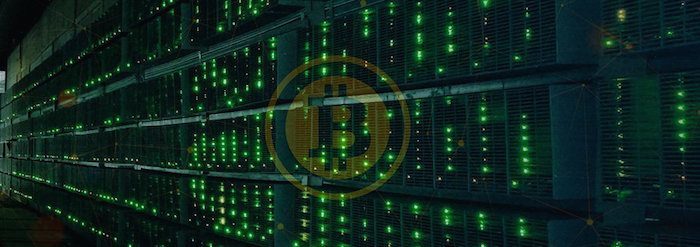
Two operators, Hashflare and Genesis Mining, have been offering contracts for several years.
Bitcoin cloud mining enables people to earn Bitcoins without bitcoin mining hardware, bitcoin mining software, electricity, bandwidth or other offline issues.
Bitcoin cloud mining, sometimes called cloud hashing, enables users to buy the output of Bitcoin mining power from Bitcoin mining hardware placed in remote data centres.
Then all Bitcoin mining is done remotely in the cloud. This enables the owners to not deal with any of the hassles usually encountered when mining bitcoins such as electricity, hosting issues, heat, installation or upkeep trouble.
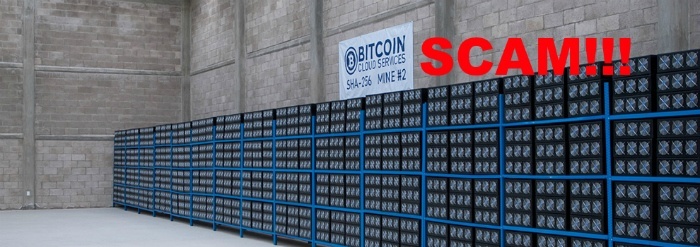
For example, Pay per GHash/s would be 0.0012 BTC / GHs for a 24 month contract.
Contracts vary from hourly to multiple years. The major factor that is unknown to both parties is the Bitcoin network difficulty and it drastically determines the profitability of the bitcoin cloud hashing contracts.
Bitcoin network difficulty is a measure of how difficult it is to find a hash below a given target.
The Bitcoin network has a global block difficulty. Valid blocks must have a hash below this target. Bitcoin mining pools also have a pool-specific share difficulty setting a lower limit for shares.
The Bitcoin network difficulty changes roughly every two weeks or 2,016 blocks.
There are all types of cloud mining options for other forms of blockchain technology.
Burmese -
Chinese (Cantonese) - 广东话
Chinese (Mandarin) - 普通话
Dutch - Nederlands
French - Français
German - Deutsche
Georgian - ქართული
Greek - Ελληνικά
Hindi - हिंदीf
Indonesian - Bahasa Indonesia
Italian - Italiano
Japanese - 日本語
Korean - 한국어
Lao - ລາວ
Nordics -
Norwegian - Norsk
Polish - Polskie
Portuguese - Português
Russian - Pусский
Spanish - Español
Swedish - Svenska
Pilipino - Tagalog
Thai - ไทย
Turkish - Türk
Vietnamese - Tiếng Việt
Bitcoin Mining Hardware Comparison
Currently, based on (1) price per hash and (2) electrical efficiency the best Bitcoin miner options are:Step 2 - Download Free Bitcoin Mining Software
Once you've received your bitcoin mining hardware, you'll need to download a special program used for Bitcoin mining. There are many programs out there that can be used for Bitcoin mining, but the two most popular are CGminer and BFGminer which are command line programs.If you prefer the ease of use that comes with a GUI, you might want to try EasyMiner which is a click and go windows/Linux/Android program.
You may want to learn more detailed information on the best bitcoin mining software.
Step 3 - Join a Bitcoin Mining Pool
Once you're ready to mine bitcoins then we recommend joining a Bitcoin mining pool. Bitcoin mining pools are groups of Bitcoin miners working together to solve a block and share in its rewards. Without a Bitcoin mining pool, you might mine bitcoins for over a year and never earn any bitcoins. It's far more convenient to share the work and split the reward with a much larger group of Bitcoin miners. Here are some options:For a fully decentralized pool, we highly recommend p2pool.
The following pools are believed to be currently fully validating blocks with Bitcoin Core 0.9.5 or later (0.10.2 or later recommended due to DoS vulnerabilities):
Step 4 - Set Up A Bitcoin Wallet
The next step to mining bitcoins is to set up a Bitcoin wallet or use your existing Bitcoin wallet to receive the Bitcoins you mine. Copay is a great Bitcoin wallet and functions on many different operating systems. Bitcoin hardware wallets are also available.Bitcoins are sent to your Bitcoin wallet by using a unique address that only belongs to you. The most important step in setting up your Bitcoin wallet is securing it from potential threats by enabling two-factor authentication or keeping it on an offline computer that doesn't have access to the Internet. Wallets can be obtained by downloading a software client to your computer.
For help in choosing a Bitcoin wallet then you can get started here.
You will also need to be able to buy and sell your Bitcoins. For this we recommend:
- SpectroCoin - European exchange with same-day SEPA and can buy with credit cards
- Kraken - The largest European exchange with same-day SEPA
- Buying Bitcoin Guide - Get help finding a Bitcoin exchange in your country.
- Local Bitcoins - This fantastic service allows you to search for people in your community willing to sell bitcoins to you directly. But be careful!
- Coinbase is a good place to start when buying bitcoins. We strongly recommend you do not keep any bitcoins in their service.
Step 5 - Stay Up To Date With Bitcoin News
Staying up to date with Bitcoin news is important for your bitcoin mining profits. If you want general Bitcoin news then we recommend the WeUseCoins news section.There is the Bitcoin Mining News Section and these are the 5 most recent articles:
- 4 Things To Consider In Bitcoin
- Comprehending Bitcoin Cost Charts
- Is it Possible to Achieve Compound Growth in Cloudmining and Bitcoin Mining Investment?
- Essential Facts About Dogecoin
- Bitcoin Transaction Malleability, Zero Change Inputs and How It Affects Bitcoin Exchanges
- An Economics Education by Bitcoin - Part III
- An Economics Education by Bitcoin - Part II
- Cryptocurrency - Who Are Involved With It?
- How Cryptocurrency Begun and Its Impact To Financial Transactions
- An Economics Education by Bitcoin - Part I
- [WARNING] - 1 August 2017 the BIP 148 UASF will occur. This
could greatly impact your earnings as a Bitcoin miner by mining either
the legacy or BIP 148 chain.
To prepare we recommend reading this UASF Guide.
Other Languages
Arabic - عربىBurmese -
Chinese (Cantonese) - 广东话
Chinese (Mandarin) - 普通话
Dutch - Nederlands
French - Français
German - Deutsche
Georgian - ქართული
Greek - Ελληνικά
Hindi - हिंदी
Indonesian - Bahasa Indonesia
Italian - Italiano
Japanese - 日本語
Korean - 한국어
Lao - ລາວ
Norwegian - Norsk
Polish - Polskie
Portuguese - Português
Russian - Pусский
Spanish - Español
Swedish - Svenska
Tagalog - Tagalog
Thai - ไทย
Turkish - Türk
Vietnamese - Tiếng Việt
Read the ten most recent Bitcoin Mining news articles, review the Archives or for general Bitcoin news visit WeUseCoins News.
- 4 Things To Consider In Bitcoin
- Comprehending Bitcoin Cost Charts
- Is it Possible to Achieve Compound Growth in Cloudmining and Bitcoin Mining Investment?
- Essential Facts About Dogecoin
- Bitcoin Transaction Malleability, Zero Change Inputs and How It Affects Bitcoin Exchanges
- An Economics Education by Bitcoin - Part III
- An Economics Education by Bitcoin - Part II
- Cryptocurrency - Who Are Involved With It?
- How Cryptocurrency Begun and Its Impact To Financial Transactions
- An Economics Education by Bitcoin - Part I
- Overview - Table of Contents
- Getting Started
- Setup Guides
- Explainers
- Alt-coins
- Opinion
- Archive
Getting Started
Setup Guides
- How To Setup Bitcoin Mining Hardware Bitmain Antminer S7 S5 and S3
- Antminer S5 and S3 - Bitcoin Mining Setup
- USB - Bitcoin Mining Setup Guide
- Spondoolies Tech SP20 - Quick Start Guide
Explainers
- What is Bitcoin mining difficulty?
- What is Proof of Work?
- What is Hashcash?
- What is the Bitcoin Mining Block Reward?
- Is Bitcoin Mining a Waste of Electricity?
- How are New Bitcoins Generated and Created?
- How do Bitcoin Mining Fees Work?
- Some Fast Facts About Bitcoin Mining
- Bitcoin Mining – It’s About Solving Problems
- A Bitcoin Mining Heart Attack
- Bitcoins May Be Virtual | But They Are Very Very Real
Alt-coins
- What is Dogecoin mining?
- What is Litecoin mining?
- What is DASH mining?
- Ethereum Mining Guide
- Ethereum cloud mining guide
Opinion
- Banks and Brokerages Should Be Mining The Blockchain
- Certain Traits Necessary For Bitcoin Mining Success
- Bitcoin Mining Pools Give Everyone a Chance To Be Involved
- Avalon Wins the ASIC Race – Sort Of
- What Bitcoin Mining Can Learn From Forex Traders
Archive of all posts on Bitcoin Mining:
- 4 Things To Consider In Bitcoin
- Comprehending Bitcoin Cost Charts
- Is it Possible to Achieve Compound Growth in Cloudmining and Bitcoin Mining Investment?
- Essential Facts About Dogecoin
- Bitcoin Transaction Malleability, Zero Change Inputs and How It Affects Bitcoin Exchanges
- An Economics Education by Bitcoin - Part III
- An Economics Education by Bitcoin - Part II
- Cryptocurrency - Who Are Involved With It?
- How Cryptocurrency Begun and Its Impact To Financial Transactions
- An Economics Education by Bitcoin - Part I
- Buying Bitcoins
- Small Computers - Now The Latest Trend for High Performance Machines
- Digital Currency And Premining
- The IRS Verdict for Bitcoin
- Bitcoins - Should You Use Them?
- Bitcoin In A Nutshell
- Dabbling In Bitcoin
- The Impending Need of Universities to Open the Blockchain Education
- 5 Famous Books On Bitcoin And Blockchain
- HashOcean Cloud Mining Scam or Not?
- Bitcoin Network Tracking by Ten and More Monitoring Websites
- Chinas Dominance In Bitcoin Mining
- Bitcoin Mining - Not A Waste Of Electricity
- Can We Have Faith for VCs, Corporatists, PR Firms and Banksters Headlines?
- Bitcoin As Primary Currency For Libertarian City Norway
- Remote Crash Bug Disclosed, Manipulated and Fixed Increased the Unlimited Hashrate
- First Time BU Block Mining Of Bitclub Network
- China Central Bank Must be In Charged for Bitcoin AML
- Genesis Mining Review
- HashFlare Cloud Mining Review
- Arguments in New York Court With A French Bitcoiner
- Reasons Why Dash Price Soar High Exponentially
- Nothing To Worry About High Transaction Fees In Bitcoin
- Bitcoin Gambling Investments 6/12
- Venezuela Troubles Continue While Bitcoin at USD 1,010
- Will 2017 be Profitable for Bitcoin Mining?
- Bitcoin Miner Review For Avalon Nano 3 USB
- Five USB Bitcoin Miners in Comparison- Bitcoin Mining
- An Evaluation of Spondoolies-Tech SP20 Jackson
- Bitcoin Mining in 2017 Profitable or Not?
- Bitmain Antminer S9 Review All You Need to Know
- Bitmain Antminer S7 Review All You Need To Know
- Bitmain Antminer S5 Review All You Need to Know
- Bitcoin Miner Reviews Which Has The Best Hardware For 2017?
- An Evaluation of Avalon6 Bitcoin Miner
- How Does Bitcoin Mining Really Operate?
- How Does MetaTrader 4 For Mac Match Up?
- Is Bitcoin Cloud Mining Actually Profitable?
- Sidechains Explained
- Decrypting Bitcoin - The Blockchain Technology Explained
- How To Profit From Bitcoin Without Owning Them
- KnCMiner Declares Bankruptcy Pending Upcoming Bitcoin Reward Halving
- Ethereum's Gold Rush is Drawing Bitcoin Miners to Ethereum
- Will Bitcoin Block Reward Halving Prove an Improvement or an Impediment for Bitcoin?
- Bitcoin Mining Centralization
- How are New Bitcoins Created and Generated?
- What is the Bitcoin Mining Block Reward?
- Is Bitcoin Mining a Waste of Electricity?
- How to earn Bitcoin?
- What Bitcoin Mining Can Learn From Forex Traders
- How do Bitcoin Mining Fees Work?
- Ethereum (Ether) Mining
- Bitcoin Mining Profitability
- What is Ethereum cloud mining?
- Bitcoin Mining Guide for a Bitcoin Miner
- Bitcoin Mining Heart Attack
- What is Proof of Work
- What is Hashcash?
- What is Bitcoin Mining Difficulty
- Learn How To Mine Bitcoins
- What is Litecoin mining? Learn all you need to get started.
- What is Dogecoin mining? Learn all you need to get started.
- Banks and Brokerages Should Be Mining The Blockchain
- What is DASH mining?
- How To Setup Bitcoin Mining Hardware Bitmain Antminer S7 S5 and S3
- Antminer S5 and S3 - Bitcoin Mining Setup
- Spondoolies-Tech SP20 Quick Start Guide
- Bitgold Review - GoldMoney Review - What to beware of!
- USB - Bitcoin Mining Setup Guide
- Become A Sponsor and Advertise
- Become A Sponsor and Advertise - Sponsorships
- Bitcoin Mining – It’s About Solving Problems
- Avalon Wins the ASIC Race – Sort Of
- Certain Traits Necessary For Bitcoin Mining Success
- Some Fast Facts About Bitcoin Mining
- Bitcoins May Be Virtual, But They’re Very Very Real
- Bitcoin Mining Pools Give Everyone a Chance To Be Involved
Bitcoin mining pools are a way for Bitcoin miners to pool their resources together and share their hashing power while splitting the reward equally according to the amount of shares they contributed to solving a block.
A "share" is awarded to members of the Bitcoin mining pool who present a valid proof of work that their Bitcoin miner solved. Bitcoin mining in pools began when the difficulty for mining increased to the point where it could take years for slower miners to generate a block.
The solution to this problem was for miners to pool their resources so they could generate blocks quicker and therefore receive a portion of the Bitcoin block reward on a consistent basis, rather than randomly once every few years.
Network Consensus

If you participate in a Bitcoin mining pool then you will want to ensure that they are engaging in behavior that is in agreement with your philosophy towards Bitcoin.
For example, some rogue developers have threatened to release software that could hard-fork the network which would likely result in tremendous financial damage.
Therefore, it is your duty to make sure that any Bitcoin mining power you direct to a mining pool does not attempt to enforce network consensus rules you disagree with.
Segregated Witness
When segwit is activated, you will want to be able to mine and relay segwit-style blocks. The following mining software has been upgraded to support segwit.- Full nodes:
- Bitcoin Core 0.14.1
- Bitcoin Knots 0.14.1
- Btcd*
- Mining software:
- Pool software:
- Relay software:
Segwit is already activated and enforced on testnet, so you may find it useful to test your infrastructure upgrade by mining with some small amount of hashrate on testnet. Alternatively, Bitcoin Core 0.13.1’s regression test mode (regtest) also supports segwit by default.
Bitcoin Mining Pools
There are many good Bitcoin mining pools to choose from. Although it's tempting to pick the most popular one, it's better for the health of the network to mine with smaller pools so as to avoid potentially harmful concentration of hashing power.The hash rate distribution is best when split among more Bitcoin mining pools.
Bitcoin Mining Pool Hash Rate Distribution

Bitcoin Mining Pool Options
For a fully decentralized pool, we highly recommend p2pool.The following pools are believed to be currently fully validating blocks with Bitcoin Core 0.11 or later:
 BTCC: BTCC is a Bitcoin
exchange, wallet, and mining pool located in China. Its mining pool
currently controls around 15% of the network hash rate.
BTCC: BTCC is a Bitcoin
exchange, wallet, and mining pool located in China. Its mining pool
currently controls around 15% of the network hash rate.
 Slush Pool: Slush Pool is run by Satoshi Labs,
a Bitcoin company based in the Czech Republic. Slush Pool was the first
mining pool and maintains around 7% of the network hash rate.
Slush Pool: Slush Pool is run by Satoshi Labs,
a Bitcoin company based in the Czech Republic. Slush Pool was the first
mining pool and maintains around 7% of the network hash rate.
 Antpool: [WARNING] - Bitmain operates Antpool and some consider them to be a malicious actor in the Bitcoin ecosystem because of the AntBleed scandal where they were intentionally including malware within mining equipment they sell. In a corporate communication,
Bitmain claimed this was a feature and not a bug. This malware would
enable Bitmain to remotely shut down equipment of customers or
competitors thus increasing their own profitability. Additionally, such
behavior could pose a risk to the entire Bitcoin network.
Antpool: [WARNING] - Bitmain operates Antpool and some consider them to be a malicious actor in the Bitcoin ecosystem because of the AntBleed scandal where they were intentionally including malware within mining equipment they sell. In a corporate communication,
Bitmain claimed this was a feature and not a bug. This malware would
enable Bitmain to remotely shut down equipment of customers or
competitors thus increasing their own profitability. Additionally, such
behavior could pose a risk to the entire Bitcoin network.
 Eligius: Eligius was one of the first Bitcoin mining pools and was founded by Luke Dashjr, a Bitcoin Core developer. Today, the pool controls just under 1% of the network hash rate.
Eligius: Eligius was one of the first Bitcoin mining pools and was founded by Luke Dashjr, a Bitcoin Core developer. Today, the pool controls just under 1% of the network hash rate.
 BitMinter: BitMinter, once one of the largest Bitcoin mining pools, now controls less than 1% of the network hash rate.
BitMinter: BitMinter, once one of the largest Bitcoin mining pools, now controls less than 1% of the network hash rate.
 Kano CKPool: Kano CKPool was founded in 2014 and currently has around 3% of the network hash rate under its control.
Kano CKPool: Kano CKPool was founded in 2014 and currently has around 3% of the network hash rate under its control.
 F2Pool: F2Pool is the
second largest Bitcoin mining pool, with around 25% of the network hash
rate. Its user interface is in Chinese, making it difficult for English
speakers to join.
F2Pool: F2Pool is the
second largest Bitcoin mining pool, with around 25% of the network hash
rate. Its user interface is in Chinese, making it difficult for English
speakers to join.
 BW Pool: BW Pool controls
around 7% of the network hash rate. Like F2Pool, its user interface is
in Chinese, making it difficult for English speakers to join.
BW Pool: BW Pool controls
around 7% of the network hash rate. Like F2Pool, its user interface is
in Chinese, making it difficult for English speakers to join.
 Bitfury: Although seen publically in block explorers and hash rate charts, BitFury is a private mining pool and cannot be joined.
Bitfury: Although seen publically in block explorers and hash rate charts, BitFury is a private mining pool and cannot be joined.
Bitcoin Mining Pool Payment Methods
Calculating your share of the bitcoins mined can be complex. In an ongoing effort to come up with the fairest method and prevent gaming of the system, many calculation schemes have been invented. The two most popular types are PPS and DGM. PPS, or 'pay per share' shifts the risk to the mining pool while they guarantee payment for every share you contribute.PPS payment schemes require a very large reserve of 10,000 BTC in order to ensure they have the means of enduring a streak of bad luck. For this reason, most Bitcoin mining pools no longer support it.
One of the few remaining PPS pools is EclipseMC. DGM is a popular payment scheme because it offers a nice balance between short round and long round blocks. However, end users must wait for full round confirmations long after the blocks are processed.
PPS: The Pay-per-Share (PPS) approach offers an instant,
guaranteed payout for each share that is solved by a miner. Miners are
paid out from the pools existing balance and can withdraw their payout
immediately. This model allows for the least possible variance in
payment for miners while also transferring much of the risk to the
pool's operator.
PROP: The Proportional approach offers a proportional
distribution of the reward when a block is found amongst all workers,
based off of the number of shares they have each found.
PPLNS: The Pay Per Last N Shares (PPLN) approach is similar to
the proportional method, but instead of counting the number of shares in
the round, it instead looks at the last N shares, no matter the
boundaries of the round.
DGM: The Double Geometric Method (DGM) is a hybrid approach that
enables the operator to absorb some of the risk. The operator receives a
portion of payouts during short rounds and returns it during longer
rounds to normalize payments.
SMPPS: The Shared Maximum Pay Per Share (SMPPS) uses a similar
approach to PPS but never pays more than the Bitcoin mining pool has
earned.
ESMPPS: The Equalized Shared Maximum Pay Per Share (ESMPPS) is
similar to SMPPS, but distributes payments equally among all miners in
the Bitcoin mining pool.
RSMPPS: The Recent Shared Maximum Pay Per Share (RSMPPS) is also
similar to SMPPS, but the system prioritizes the most recent Bitcoin
miners first.
CPPSRB: The Capped Pay Per Share with Recent Backpay uses a
Maximum Pay Per Share (MPPS) reward system that will pay Bitcoin miners
as much as possible using the income from finding blocks, but will never
go bankrupt.
BPM: Bitcoin Pooled mining (BPM), also known as "Slush's pool",
uses a system where older shares from the beginning of a block round are
given less weight than more recent shares. This reduces the ability to
cheat the mining pool system by switching pools during a round.
POT: The Pay on Target (POT) approach is a high variance PPS that
pays out in accordance with the difficulty of work returned to the pool
by a miner, rather than the difficulty of work done by the pool itself.
SCORE: The SCORE based approach uses a system whereby a
proportional reward is distributed and weighed by the time the work was
submitted. This process makes later shares worth more than earlier
shares and scored by time, thus rewards are calculated in proportion to
the scores and not shares submitted.
ELIGIUS: Eligius was designed by Luke Jr., creator of BFGMiner, to incorporate the strengths of PPS and BPM pools, as miners submit proofs-of-work
to earn shares and the pool pays out immediately. When the block
rewards are distributed, they are divided equally among all shares since
the last valid block and the shares contributed to stale blocks are
cycled into the next block's shares. Rewards are only paid out if a
miner earns at least. 67108864 and if the amount owed is less than that
it will be rolled over to the next block until the limit is achieved.
However, if a Bitcoin miner does not submit a share for over a period of
a week, then the pool will send any remaining balance, regardless of
its size.
Triplemining: Triplemining brings together medium-sized pools
with no fees and redistributes 1% of every block found, which allows
your share to grow faster than any other Bitcoin mining pool approach.
The administrators of these Bitcoin mining pools use some of the
Bitcoins generated when a block is found to add to a jackpot that is
triggered and paid out to the member of the pool who found the block. In
this way, everyone in the pool has a better chance to make additional
Bitcoins, regardless of their processing power.
Best Bitcoin Cloud Mining Contract Reviews and Comparisons

- Overview - Table of Contents
- What is Bitcoin Cloud Mining?
- What are Bitcoin Cloud Mining Advantages?
- What are Bitcoin Cloud Mining Disadvantages?
- Best Bitcoin Cloud Mining Services
- Best Bitcoin Cloud Mining Contracts
- Best Litecoin Cloud Mining Services
- Best Dash Cloud Mining Services
- Best Ether Cloud Mining Services
- Bitcoin Cloud Mining Scams
- Cryptocurrency Cloud Mining Companies
- Other Languages
What is Bitcoin Cloud Mining?
Cloud mining or cloud hashing enables users to purchase mining capacity that of hardware in data centres.Two operators, Hashflare and Genesis Mining, have been offering contracts for several years.
Bitcoin cloud mining enables people to earn Bitcoins without bitcoin mining hardware, bitcoin mining software, electricity, bandwidth or other offline issues.
Bitcoin cloud mining, sometimes called cloud hashing, enables users to buy the output of Bitcoin mining power from Bitcoin mining hardware placed in remote data centres.
Then all Bitcoin mining is done remotely in the cloud. This enables the owners to not deal with any of the hassles usually encountered when mining bitcoins such as electricity, hosting issues, heat, installation or upkeep trouble.
What are Bitcoin Cloud Mining Advantages?
- No excess heat to deal with
- Quiet because of no constantly humming fans
- No electricity costs
- No bitcoin mining equipment to sell when bitcoin mining is no longer profitable
- No ventilation problems with hot equipment
- No preordered bitcoin mining hardware that may not be delivered on time by bitcoin mining equipment suppliers
What are Bitcoin Cloud Mining Disadvantages?

- FRAUD!!!
- Unverifiable or otherwise shady Bitcoin cloud mining operations
- No fun! If you like building your own Bitcoin hashing systems.
- Lower profits – Bitcoin cloud mining services or mining company will have expenses
- Bitcoin mining contracts may have the ability to cease operations or payouts in the contracts if the Bitcoin price is too low
- Lack of possession of the Bitcoin mining hardware
- Lack of ability to change the Bitcoin mining software
Best Bitcoin Cloud Hashing Services
Being listed in this section is NOT an endorsement of these services and is to serve merely as a Bitcoin cloud mining comparison. There have been a tremendous amount of Bitcoin cloud mining scams.
Hashflare Review: Hashflare
offers SHA-256 mining contracts and more profitable SHA-256 coins can
be mined while automatic payouts are still in BTC. Customers must
purchase at least 10 GH/s.
Genesis Mining Review: Genesis
Mining is the largest Bitcoin and scrypt cloud mining provider. Genesis
Mining offers three Bitcoin cloud mining plans that are reasonably
priced. Zcash mining contracts are also available.
Hashing 24 Review: Hashing24
has been involved with Bitcoin mining since 2012. They have facilities
in Iceland and Georgia. They use modern ASIC chips from BitFury deliver
the maximum performance and efficiency possible.
Minex Review: Minex
is an innovative aggregator of blockchain projects presented in an
economic simulation game format. Users purchase Cloudpacks which can
then be used to build an index from pre-picked sets of cloud mining
farms, lotteries, casinos, real-world markets and much more.
Minergate Review: Offers both pool and merged mining and cloud mining services for Bitcoin.
Hashnest Review: Hashnest
is operated by Bitmain, the producer of the Antminer line of Bitcoin
miners. HashNest currently has over 600 Antminer S7s for rent. You can
view the most up-to-date pricing and availability on Hashnest's website.
At the time of writing one Antminer S7's hash rate can be rented for
$1,200.
Bitcoin Cloud Mining Review: Currently all Bitcoin Cloud Mining contracts are sold out.
NiceHash Review: NiceHash is unique in that it uses an orderbook
to match mining contract buyers and sellers. Check its website for
up-to-date prices.
Eobot Review: Start cloud mining Bitcoin with as little as $10. Eobot claims customers can break even in 14 months.
MineOnCloud Review: MineOnCloud currently has about 35 TH/s of
mining equipment for rent in the cloud. Some miners available for rent
include AntMiner S4s and S5s.
Best Bitcoin Cloud Mining Contracts and Comparisons
Bitcoin cloud mining contracts are usually sold for bitcoins on a per hash basis for a particular period of time and there are several factors that impact Bitcoin cloud mining contract profitability with the primary factor being the Bitcoin price.For example, Pay per GHash/s would be 0.0012 BTC / GHs for a 24 month contract.
Contracts vary from hourly to multiple years. The major factor that is unknown to both parties is the Bitcoin network difficulty and it drastically determines the profitability of the bitcoin cloud hashing contracts.
Bitcoin network difficulty is a measure of how difficult it is to find a hash below a given target.
The Bitcoin network has a global block difficulty. Valid blocks must have a hash below this target. Bitcoin mining pools also have a pool-specific share difficulty setting a lower limit for shares.
The Bitcoin network difficulty changes roughly every two weeks or 2,016 blocks.
There are all types of cloud mining options for other forms of blockchain technology.
Best Litecoin Cloud Mining Services and Comparisons
There are limited options for Litecoin cloud mining contracts. If nothing on the list below meets your needs, you can buy Bitcoin cloud mining contracts (listed above) and simply convert the bitcoins you earn to litecoin.
Hashflare Review: Hashflare offers scrypt mining contracts with a minimum purchase of 1 MH/s.
Genesis Mining Review: Genesis Mining offers Litecoin cloud mining contracts.
Minex Review: Minex
is an innovative aggregator of blockchain projects presented in an
economic simulation game format. Users purchase Cloudpacks which can
then be used to build an index from pre-picked sets of cloud mining
farms, lotteries, casinos, real-world markets and much more.
Minergate Review: Offers both pool and merged mining and cloud mining services for Litecoin.
Eobot Review: Eobot offers Litecoin cloud mining contracts with 0.0071 LTC monthly payouts.
Best Dash Cloud Mining Services and Comparisons
There are limited options for Dash cloud mining contracts. If nothing on the list below meets your needs, you can buy Bitcoin cloud mining contracts (listed above) and simply convert the bitcoins you earn to Dash.
Genesis Mining Review: Genesis
Mining is the largest X11 cloud mining provider. Genesis Mining offers
three Dash X11 cloud mining plans that are reasonably priced.
Best Ether Cloud Mining Services and Comparisons
There are limited options for Ether cloud mining contracts. If nothing on the list below meets your needs, you can buy Bitcoin cloud mining contracts (listed above) and simply convert the bitcoins you earn to ether.
Hashflare Review: Hashflare is a large Ether cloud mining provider with reasonably priced Ethereum cloud mining contracts.
Genesis Mining Review: Genesis Mining is the largest Ether cloud mining provider. Ethereum cloud mining contracts are reasonably priced.
Minex Review: Minex
is an innovative aggregator of blockchain projects presented in an
economic simulation game format. Users purchase Cloudpacks which can
then be used to build an index from pre-picked sets of cloud mining
farms, lotteries, casinos, real-world markets and much more.
Eobot Review: Eobot offers Ethereum cloud mining contracts with 0.0060 ETH monthly payouts.
This Ethereum cloud mining guide will show you how to mine Ethereum using Amazon cloud servers.Bitcoin Cloud Mining Scams
There have been a tremendous amount of Bitcoin cloud mining scams like the possible $500,000 Bitcoin cloud mining ponzi scheme that was uncovered. Potential buyers should be extremely guarded and careful before purchasing any bitcoin mining contracts. Services to beware of:
Scrypt.cc Review: Scrypt.cc allows purchase of KHS in a matter of
seconds, start mining right away and even be able to trade your KHS in
real time with prices based on supply and demand! All KHashes are safely
stored and maintained in 2 secured data-centres.
PB Mining Review: Claims to operate Bitcoin mining ASIC hardware.
When customers buy a bitcoin mining contract then they will begin
earning Bitcoins instantly. At Piggyback Mining, they cover the
electricity costs and all Bitcoin mining pool fees. The Bitcoin mining
contract is 100% insured because they want customers to succeed.
Bitcoin Cloud Services (BCS) Review: Appears to have been a $500,000 Ponzi scam fraud.
Zeushash Review: Appears to have halted payouts.
Bitminer.io Review: Based on user reports they appear to have halted payouts.
Cryptocurrency Cloud Mining Companies
Hashflare Review: An Estonian cloud miner with SHA-256, Scrypt and Scrypt-N options and currently appears to be the best value.
Genesis Mining Review: Genesis Mining is the largest Bitcoin and scrypt cloud mining provider.
Hashing 24 Review: Hashing24 has been involved with Bitcoin
mining since 2012. They have facilities in Iceland and Georgia. They use
modern ASIC chips from BitFury deliver the maximum performance and
efficiency possible.
Minex Review: Minex is an innovative aggregator of blockchain
projects presented in an economic simulation game format. Users purchase
Cloudpacks which can then be used to build an index from pre-picked
sets of cloud mining farms, lotteries, casinos, real-world markets and
much more.
Minergate Review: MinerGate is a mining pool created by a group
of cryptocoin enthusiasts. It is the first pool which provides service
for merged mining. This means that while mining on our pool you can mine
different coins simultaniously without decrease of hashrate for major
coin.
Hashnest Review: Hashnest is operated by Bitmain, producer of the
Antminer line of miners. HashNest currently has over 600 Antminer S7s
for rent. You can view the most up-to-date pricing and availability on
Hashnest's website.
Bitcoin Cloud Mining Review: Supposedly has been mining Bitcoin
since mid-2013. All Bitcoin miners are located in a state-of-the-art
data centre in Australia and they have direct access to high quality
equipment and 24/7 support.
NiceHash Review: NiceHash offers you to sell and buy hashing
power. Selling hashing power is as simple as connecting your miner to
our stratum mining pools while buyers can buy hashing power on demand,
on pay-as-you-go basis. Claims to bring an innovative easy-to-use and
risk-free cloud mining service. You can mine the vast majority of
popular coins, based on SHA-256 (Bitcoin, etc.), Scrypt (Litecoin,
Dogecoin, etc.), Scrypt-N (Vertcoin, etc.) and X11 (DarkCoin, etc.).
Eobot Review: Claims to be the easiest, cheapest, and best cloud
mining solution. Start with as little as $10 using PayPal and choose
between any cryptocurrency including Bitcoin, Litecoin, Peercoin,
Namecoin, Feathercoin, Dogecoin, NautilusCoin, and Vertcoin.
MineOnCloud Review: MineOnCloud appears to have obselete
hardware. It was launched on November 2013. They offer Bitcoin mining
contracts for SHA256 using a very stable ASIC 28nm chip. They have two
bitcoin mining contract options - a day pass and an annual contract.
Customers can choose the Bitcoin mining pool and change every month for
free with year contract.
Scrypt.cc Review: Scrypt.cc allows purchase of KHS in a matter of
seconds, start mining right away and even be able to trade your KHS in
real time with prices based on supply and demand! All KHashes are safely
stored and maintained in 2 secured data-centres.
PB Mining Review: Claims to operate Bitcoin mining ASIC hardware.
When customers buy a bitcoin mining contract then they will begin
earning Bitcoins instantly. At Piggyback Mining, they cover the
electricity costs and all Bitcoin mining pool fees. The Bitcoin mining
contract is 100% insured because they want customers to succeed.
Bitcoin Cloud Services (BCS) Review: Appears to have been a $500,000 Ponzi scam fraud.
Zeushash Review: Appears to have halted payouts.
Bitminer.io Review: Based on user reports they appear to have halted payouts.
Other Languages
Arabic - عربىBurmese -
Chinese (Cantonese) - 广东话
Chinese (Mandarin) - 普通话
Dutch - Nederlands
French - Français
German - Deutsche
Georgian - ქართული
Greek - Ελληνικά
Hindi - हिंदीf
Indonesian - Bahasa Indonesia
Italian - Italiano
Japanese - 日本語
Korean - 한국어
Lao - ລາວ
Nordics -
Norwegian - Norsk
Polish - Polskie
Portuguese - Português
Russian - Pусский
Spanish - Español
Swedish - Svenska
Pilipino - Tagalog
Thai - ไทย
Turkish - Türk
Vietnamese - Tiếng Việt
Bitcoin Mining Software Guide

- Overview - Table of Contents
- Network Consensus
- Bitcoin Wallet Software
- Free Bitcoin Mining Applications
- Windows Mining Software
- Mac OSX Mining Software
- ASIC Bitcoin Mining Software
- Bitcoin Cloud Mining Software
The software delivers the work to the miners and receives the completed work from the miners and relays that information back to the blockchain and your mining pool. The best Bitcoin mining software can run on almost any operating system, such as OSX, Windows, Linux, and has even been ported to work on a Raspberry Pi with some modifications for drivers depending on your mining setup.
Not only does the Bitcoin mining software relay the input and output of your Bitcoin miners to the blockchain, but it also monitors them and displays general statistics such as the temperature, hashrate, fan speed, and average speed of the Bitcoin miner.
There are a few different types of Bitcoin mining software out there and each have their own advantages and disadvantages, so be sure to read up on the various mining software out there.
Network Consensus
 If you solo-mine, meaning you do not mine with a Bitcoin mining pool, then you will need to ensure that you are in consensus with the Bitcoin network. The best way is to use the official BitCore client.
If you solo-mine, meaning you do not mine with a Bitcoin mining pool, then you will need to ensure that you are in consensus with the Bitcoin network. The best way is to use the official BitCore client.
If you participate in a Bitcoin mining pool then you will want to ensure that they are engaging in behavior that is in agreement with your philosophy towards Bitcoin.
How much bandwidth does Bitcoin mining take? If you are mining with a pool then the amount should be negligible with about 10MB/day. However, what you do need is exceptional connectivity so that you get any updates on the work as fast as possible.
For example, some rogue developers have threatened to release software that could hard-fork the network which would likely result in tremendous financial damage.
Therefore, it is your duty to make sure that any Bitcoin mining power you direct to a mining pool does not attempt to enforce network consensus rules you disagree with.
Bitcoin Wallet Software
The whole point of mining bitcoins is to earn them!But once you earn them then where do you keep them safe and secure? For a Bitcoin wallet we highly recommend using one where you hold your own private keys in contrast to to a hosted wallet like Coinbase or Circle.
- Breadwallet - easy to use mobile Bitcoin wallet
- Copay - easy to use mobile Bitcoin wallet
- Armory - highly secure desktop Bitcoin wallet
Once mined Bitcoin becomes like a currency that can be purchased, used in transactions or even traded like with this Bitcoin trading platform.
For this we recommend:
- Kraken - The largest European exchange with same-day SEPA
- Local Bitcoins - This fantastic service allows you to search for people in your community willing to sell bitcoins to you directly. But be careful!
Examples of the best Bitcoin mining software for Windows, Linux and Mac OSX:
MinePeon: Open source and may need WinDisk32Imager.
EasyMiner: A GUI based miner for Windows, Linux and Android. EasyMiner acts as a convenient wrapper for the built in CG; BFGminer softwares. It auto configures your Bitcoin miners and provides performance graphs to for easy visualization of your Bitcoin mining activity.
BFGMiner: A modular ASIC, FPGA, GPU and CPU miner written in C, cross platform for Linux, Mac, and Windows including support for OpenWrt-capable routers.
CGMiner: This is a multi-threaded multi-pool GPU, FPGA and ASIC miner with ATI GPU monitoring, (over)clocking and fanspeed support for bitcoin and derivative coins.
EasyMiner: A GUI based miner for Windows, Linux and Android. EasyMiner acts as a convenient wrapper for the built in CG; BFGminer softwares. It auto configures your Bitcoin miners and provides performance graphs to for easy visualization of your Bitcoin mining activity.
BFGMiner: A modular ASIC, FPGA, GPU and CPU miner written in C, cross platform for Linux, Mac, and Windows including support for OpenWrt-capable routers.
CGMiner: This is a multi-threaded multi-pool GPU, FPGA and ASIC miner with ATI GPU monitoring, (over)clocking and fanspeed support for bitcoin and derivative coins.
Additional Free Bitcoin Mining Applications
MinePeon: Open source and may need WinDisk32Imager.
EasyMiner: A GUI based miner for Windows, Linux and Android. EasyMiner acts as a convenient wrapper for the built in CG; BFGminer softwares. It auto configures your Bitcoin miners and provides performance graphs to for easy visualization of your Bitcoin mining activity.
BFGMiner: A modular ASIC, FPGA, GPU and CPU miner written in C, cross platform for Linux, Mac, and Windows including support for OpenWrt-capable routers.
CGMiner: This is a multi-threaded multi-pool GPU, FPGA and ASIC miner with ATI GPU monitoring, (over)clocking and fanspeed support for bitcoin and derivative coins.
50Miner: A GUI frontend for Windows (Poclbm, Phoenix, DiabloMiner).
BTCMiner: Bitcoin Miner for ZTEX FPGA Boards
BitMoose: Run Miners as a Windows Service.
Poclbm: Python/OpenCL GPU miner (GUI (Windows and MacOS X))
Poclbm-mod: more efficient version of Poclbm (GUI)
DiabloMiner: Java/OpenCL GPU miner (MAC OS X GUI)
RPC Miner: remote RPC miner (MAC OS X GUI)
Phoenix miner: Released in 2011. Free and open source.
CPU Miner: Mining software for solo or pooled mining.
Ufasoft Miner: CPU/GPU miner for Windows pooled mining.
Pyminer: Released in 2011. CPU mining client.
Remote Miner: Open source Bitcoin miner for pooled mining. Works with RPC Miner.
Open Source FPGA Bitcoin Miner: Released in 2011. Makes use of a compatible FPGA Board. Can be used to mine in a pool or solo.
EasyMiner: A GUI based miner for Windows, Linux and Android. EasyMiner acts as a convenient wrapper for the built in CG; BFGminer softwares. It auto configures your Bitcoin miners and provides performance graphs to for easy visualization of your Bitcoin mining activity.
BFGMiner: A modular ASIC, FPGA, GPU and CPU miner written in C, cross platform for Linux, Mac, and Windows including support for OpenWrt-capable routers.
CGMiner: This is a multi-threaded multi-pool GPU, FPGA and ASIC miner with ATI GPU monitoring, (over)clocking and fanspeed support for bitcoin and derivative coins.
50Miner: A GUI frontend for Windows (Poclbm, Phoenix, DiabloMiner).
BTCMiner: Bitcoin Miner for ZTEX FPGA Boards
BitMoose: Run Miners as a Windows Service.
Poclbm: Python/OpenCL GPU miner (GUI (Windows and MacOS X))
Poclbm-mod: more efficient version of Poclbm (GUI)
DiabloMiner: Java/OpenCL GPU miner (MAC OS X GUI)
RPC Miner: remote RPC miner (MAC OS X GUI)
Phoenix miner: Released in 2011. Free and open source.
CPU Miner: Mining software for solo or pooled mining.
Ufasoft Miner: CPU/GPU miner for Windows pooled mining.
Pyminer: Released in 2011. CPU mining client.
Remote Miner: Open source Bitcoin miner for pooled mining. Works with RPC Miner.
Open Source FPGA Bitcoin Miner: Released in 2011. Makes use of a compatible FPGA Board. Can be used to mine in a pool or solo.
Best Bitcoin Mining Software Windows
MinePeon: Open source and may need WinDisk32Imager.
EasyMiner: A GUI based miner for Windows, Linux and Android. EasyMiner acts as a convenient wrapper for the built in CG; BFGminer softwares. It auto configures your Bitcoin miners and provides performance graphs to for easy visualization of your Bitcoin mining activity.
BFGMiner: A modular ASIC, FPGA, GPU and CPU miner written in C, cross platform for Linux, Mac, and Windows including support for OpenWrt-capable routers.
CGMiner: This is a multi-threaded multi-pool GPU, FPGA and ASIC miner with ATI GPU monitoring, (over)clocking and fanspeed support for bitcoin and derivative coins.
50Miner: A GUI frontend for Windows (Poclbm, Phoenix, DiabloMiner).
BitMoose: Run Miners as a Windows Service.
Poclbm: Python/OpenCL GPU miner (GUI (Windows and MacOS X))
Poclbm-mod: more efficient version of Poclbm (GUI)
CPU Miner: Mining software for solo or pooled mining.
Ufasoft Miner: CPU/GPU miner for Windows pooled mining.
EasyMiner: A GUI based miner for Windows, Linux and Android. EasyMiner acts as a convenient wrapper for the built in CG; BFGminer softwares. It auto configures your Bitcoin miners and provides performance graphs to for easy visualization of your Bitcoin mining activity.
BFGMiner: A modular ASIC, FPGA, GPU and CPU miner written in C, cross platform for Linux, Mac, and Windows including support for OpenWrt-capable routers.
CGMiner: This is a multi-threaded multi-pool GPU, FPGA and ASIC miner with ATI GPU monitoring, (over)clocking and fanspeed support for bitcoin and derivative coins.
50Miner: A GUI frontend for Windows (Poclbm, Phoenix, DiabloMiner).
BitMoose: Run Miners as a Windows Service.
Poclbm: Python/OpenCL GPU miner (GUI (Windows and MacOS X))
Poclbm-mod: more efficient version of Poclbm (GUI)
CPU Miner: Mining software for solo or pooled mining.
Ufasoft Miner: CPU/GPU miner for Windows pooled mining.
Best Bitcoin Mining Software Mac OSX
MinePeon: Open source and may need WinDisk32Imager.
EasyMiner: A GUI based miner for Windows, Linux and Android. EasyMiner acts as a convenient wrapper for the built in CG; BFGminer softwares. It auto configures your Bitcoin miners and provides performance graphs to for easy visualization of your Bitcoin mining activity.
BFGMiner: A modular ASIC, FPGA, GPU and CPU miner written in C, cross platform for Linux, Mac, and Windows including support for OpenWrt-capable routers.
CGMiner: This is a multi-threaded multi-pool GPU, FPGA and ASIC miner with ATI GPU monitoring, (over)clocking and fanspeed support for bitcoin and derivative coins.
Poclbm: Python/OpenCL GPU miner (GUI (Windows and MacOS X))
Poclbm-mod: more efficient version of Poclbm (GUI)
DiabloMiner: Java/OpenCL GPU miner (MAC OS X GUI)
RPC Miner: remote RPC miner (MAC OS X GUI)
EasyMiner: A GUI based miner for Windows, Linux and Android. EasyMiner acts as a convenient wrapper for the built in CG; BFGminer softwares. It auto configures your Bitcoin miners and provides performance graphs to for easy visualization of your Bitcoin mining activity.
BFGMiner: A modular ASIC, FPGA, GPU and CPU miner written in C, cross platform for Linux, Mac, and Windows including support for OpenWrt-capable routers.
CGMiner: This is a multi-threaded multi-pool GPU, FPGA and ASIC miner with ATI GPU monitoring, (over)clocking and fanspeed support for bitcoin and derivative coins.
Poclbm: Python/OpenCL GPU miner (GUI (Windows and MacOS X))
Poclbm-mod: more efficient version of Poclbm (GUI)
DiabloMiner: Java/OpenCL GPU miner (MAC OS X GUI)
RPC Miner: remote RPC miner (MAC OS X GUI)
ASIC Bitcoin Mining Software
BFGMiner: A
modular ASIC, FPGA, GPU and CPU miner written in C, cross platform for
Linux, Mac, and Windows including support for OpenWrt-capable routers.
CGMiner: This is a multi-threaded multi-pool GPU, FPGA and ASIC miner with ATI GPU monitoring, (over)clocking and fanspeed support for bitcoin and derivative coins.
CGMiner: This is a multi-threaded multi-pool GPU, FPGA and ASIC miner with ATI GPU monitoring, (over)clocking and fanspeed support for bitcoin and derivative coins.
Bitcoin Cloud Mining Software
Being listed in this section is NOT an endorsement of these services.
There have been a tremendous amount of Bitcoin cloud mining scams.
Hashflare Review: Hashflare
offers SHA-256 mining contracts and more profitable SHA-256 coins can
be mined while automatic payouts are still in BTC. Customers must
purchase at least 10 GH/s.
Genesis Mining Review: Genesis
Mining is the largest Bitcoin and scrypt cloud mining provider. Genesis
Mining offers three Bitcoin cloud mining plans that are reasonably
priced. Zcash mining contracts are also available.
Hashing 24 Review: Hashing24
has been involved with Bitcoin mining since 2012. They have facilities
in Iceland and Georgia. They use modern ASIC chips from BitFury deliver
the maximum performance and efficiency possible.
Minex Review: Minex
is an innovative aggregator of blockchain projects presented in an
economic simulation game format. Users purchase Cloudpacks which can
then be used to build an index from pre-picked sets of cloud mining
farms, lotteries, casinos, real-world markets and much more.
Minergate Review: Offers both pool and merged mining and cloud mining services for Bitcoin.
Hashnest Review: Hashnest
is operated by Bitmain, the producer of the Antminer line of Bitcoin
miners. HashNest currently has over 600 Antminer S7s for rent. You can
view the most up-to-date pricing and availability on Hashnest's website.
At the time of writing one Antminer S7's hash rate can be rented for
$1,200.
Bitcoin Cloud Mining Review: Currently all Bitcoin Cloud Mining contracts are sold out.
NiceHash Review: NiceHash is unique in that it uses an orderbook
to match mining contract buyers and sellers. Check its website for
up-to-date prices.
Eobot Review: Start cloud mining Bitcoin with as little as $10. Eobot claims customers can break even in 14 months.
MineOnCloud Review: MineOnCloud currently has about 35 TH/s of
mining equipment for rent in the cloud. Some miners available for rent
include AntMiner S4s and S5s.
TRANSCRIPT - Do it yourself with Bitcoin mining software
What's going on every one? This is Fredand this Part 2 of our DIY Bitcoin Miner. Today, we're going to take a look at software.Okay, so the first thing that you need to do before you could start Bitcoin mining is to sign up for a Bitcoin wallet. Now there’s a lot of wallets that you could choose from but I prefer Circle. Now let’s head over and set up an account. All you have to do is enter in your email and choose a password.
Once you log in to your account you will see a summary of your Bitcoin balance and transactions. But before you can receive any Bitcoins you need to set up a Bitcoin address. You could do so by clicking account settings.
Once you are on the account settings page go ahead and click Bitcoin Addresses. From there click Create New Address. This generates a long string of numbers and letters. This is the address that we will need to enter into our mining pool. So let's take a look at that now.
There are many mining pools that you can choose from, but I prefer BitMinter as my primary pool and Slush’s pool as my backup. Just create an account whichever one you choose and log in. Your account details page will normally have an auto cash out option.
This is where we will enter in our wallet address that we created earlier. When you have mined enough Bitcoins to meet the threshold it would automatically be transferred to your Bitcoin wallet.
Next, go up top to the My Account drop down and select Workers. This worker information is what you need to input into the mining software so that you get credit for the work that is done. You do not need to secure this information with a difficult username or password because anyone that uses this information will be giving you credit.
Now let's take a look at setting up the mining software. As mentioned in Part 1 of the series we'll be using the MinePeon operating system. This can be downloaded from sourceforge.net.
Now this is the image that we will need to write onto our SD card. Another software that we need to download is called the Win32 Disk Imager. This can also be found on sourceforge.net. This is the software that we will use to write the MinePeon image onto our SD card.
Once you have downloaded both files insert your SD card into your computer. Then open up Win32 Disk Imager. Simply select the location of your MinePeon image then select the correct drive for your SD card. All you have to do now is click write. This will write the MinePeon image on to your SD card. Insert the SD card into your Raspberry Pi as shown on Part 1 of the series then power up the unit.
Now sign in to MinePeon by typing in the network IP address into your browser. The easiest way to find this IP address is by logging in to your router and looking for the device called MinePeon. You will then be prompted to enter in your MinePeon's username and password. The default setting for this is MinePeon for the username, peon for the password. You will see a security warning but do not be alarmed. This is perfectly normal so proceed anyways. You will then be asked to re-enter the username and password.
So again, MinePeon is the username peon is the password. You are now finally in MinePeon's dashboard. This is where you can monitor the performance of your mining rig. Head up top and click pools. This page allows you to set up your mining pools. As you can see I have BitMinter as my primary pool and Slush’s pool as my secondary. Just enter in the URL of your mining pool, the username and password if you have one.
Then go ahead and submit your settings. You may need to reboot MinePeon after any changes. Great job every one. You are now officially mining for Bitcoins.
All right, so that should be everything that you need to start Bitcoin mining.
Bitcoin Mining Hardware Guide

The best Bitcoin mining hardware has evolved dramatically since 2009
During the winter of 2011, a new industry sprang up with custom equipment that pushed the performance standards even higher. The first wave of these specialty bitcoin mining devices were easy to use Bitcoin miners were based on field-programmable gate array (FPGA) processors and attached to computers using a convenient USB connection.
FPGA miners used much less power than CPU's or GPU's and made concentrated mining farms possible for the first time.
Today's modern and best bitcoin mining hardware
Application-specific integrated circuit (ASIC) miners have taken over completely. These ASIC machines mine at unprecedented speeds while consuming much less power than FPGA or GPU mining rigs. Several reputable companies have established themselves with excellent products.Bitcoin Mining Hardware Comparison
Currently, based on (1) price per hash and (2) electrical efficiency the best Bitcoin miner options are:Best Bitcoin Mining Hardware
 Two major factors go into determining the best bitcoin mining hardware: (1) cost and (2) electricity efficiency.
Two major factors go into determining the best bitcoin mining hardware: (1) cost and (2) electricity efficiency.
Bitcoin mining is difficult to do profitably but if you try then this Bitcoin miner is probably a good shot.
ASIC Bitcoin Mining Hardware
Application-specific integrated circuit chips (ASICs) are bitcoin mining hardware created solely to solve Bitcoin blocks. They have only minimal requirements for other normal computer applications. Consequently, ASIC Bitcoin mining systems can solve Bitcoin blocks much quicker and use less less electricity or power than older bitcoin mining hardware like CPUs, GPUs or FPGAs.As Bitcoin mining increases in popularity and the Bitcoin price rises so does the value of ASIC Bitcoin mining hardware. As more Bitcoin mining hardware is deployed to secure the Bitcoin network the Bitcoin difficulty rises. This makes it impossible to profitably compete without a Bitcoin ASIC system. Furthermore, Bitcoin ASIC technology keeps getting faster, more efficient and more productive so it keeps pushing the limits of what makes the best Bitcoin mining hardware.
Some models of Bitcoin miners include Antminer S5, Antminer U3, ASICMiner BE Tube, ASICMiner BE Prisma, Avalon 2, Avalon 3, BTC Garden AM-V1 616 GH/s, VMC PLATINUM 6 MODULE, and USB miners.
Best Bitcoin Cloud Mining Services
Hashflare Review: Hashflare
offers SHA-256 mining contracts and more profitable SHA-256 coins can
be mined while automatic payouts are still in BTC. Customers must
purchase at least 10 GH/s.
Genesis Mining Review: Genesis
Mining is the largest Bitcoin and scrypt cloud mining provider. Genesis
Mining offers three Bitcoin cloud mining plans that are reasonably
priced. Zcash mining contracts are also available.
Hashing 24 Review: Hashing24
has been involved with Bitcoin mining since 2012. They have facilities
in Iceland and Georgia. They use modern ASIC chips from BitFury deliver
the maximum performance and efficiency possible.
Minex Review: Minex
is an innovative aggregator of blockchain projects presented in an
economic simulation game format. Users purchase Cloudpacks which can
then be used to build an index from pre-picked sets of cloud mining
farms, lotteries, casinos, real-world markets and much more.
Minergate Review: Offers both pool and merged mining and cloud mining services for Bitcoin.
Hashnest Review: Hashnest
is operated by Bitmain, the producer of the Antminer line of Bitcoin
miners. HashNest currently has over 600 Antminer S7s for rent. You can
view the most up-to-date pricing and availability on Hashnest's website.
At the time of writing one Antminer S7's hash rate can be rented for
$1,200.
Bitcoin Cloud Mining Review: Currently all Bitcoin Cloud Mining contracts are sold out.
NiceHash Review: NiceHash is unique in that it uses an orderbook
to match mining contract buyers and sellers. Check its website for
up-to-date prices.
Eobot Review: Start cloud mining Bitcoin with as little as $10. Eobot claims customers can break even in 14 months.
MineOnCloud Review: MineOnCloud currently has about 35 TH/s of
mining equipment for rent in the cloud. Some miners available for rent
include AntMiner S4s and S5s.
Full List of Mining Hardware
| Miner | Capacity | Efficiency | Price |
|---|---|---|---|
| AntMiner S1 | 180 Gh/s | 2.0 W/Gh | $299.0 |
| AntMiner S2 | 1000 Gh/s | 1.1 W/Gh | $2259.0 |
| AntMiner S3 | 441 Gh/s | 0.77 W/Gh | $382.0 |
| AntMiner S4 | 2000 Gh/s | 0.7 W/Gh | $1400.0 |
| AntMiner S5 | 1155 Gh/s | 0.51 W/Gh | $370.0 |
| AntMiner S5+ | 7722 Gh/s | 0.44 W/Gh | $2307.0 |
| AntMiner S7 | 4.73 Th/s | 0.25 W/Gh | $479.95 |
| AntMiner S9 | 13.5 Th/s | 0.098 W/Gh | $1,987.95 |
| AntMiner U1 | 2 Gh/s | 1.25 W/Gh | $29.0 |
| AntMiner U2 | 2 Gh/s | 1.0 W/Gh | $49.66 |
| AntMiner U3 | 63 Gh/s | 1.0 W/Gh | $38.0 |
| ASICMiner BE Blade | 11 Gh/s | 7.72 W/Gh | $350.0 |
| ASICMiner BE Cube | 30 Gh/s | 6.67 W/Gh | $550.0 |
| ASICMiner BE Sapphire | 0 Gh/s | 7.59 W/Gh | $20.0 |
| ASICMiner BE Tube | 800 Gh/s | 1.13 W/Gh | $320.0 |
| ASICMiner BE Prisma | 1400 Gh/s | 0.79 W/Gh | $600.0 |
| Avalon Batch 1 | 66 Gh/s | 9.35 W/Gh | $1299.0 |
| Avalon Batch 2 | 82 Gh/s | 8.54 W/Gh | $1499.0 |
| Avalon Batch 3 | 82 Gh/s | 8.54 W/Gh | $1499.0 |
| Avalon2 | 300 Gh/s | N/A | $3075.0 |
| Avalon3 | 800 Gh/s | N/A | N/A |
| Avalon6 | 3.5 Th/s | 0.29 W/Gh | $499.95 |
| bi*fury | 5 Gh/s | 0.85 W/Gh | $209.0 |
| BFL SC 5Gh/s | 5 Gh/s | 6.0 W/Gh | $274.0 |
| BFL SC 10 Gh/s | 10 Gh/s | N/A | $50.0 |
| BFL SC 25 Gh/s | 25 Gh/s | 6.0 W/Gh | $1249.0 |
| BFL Little Single | 30 Gh/s | N/A | $649.0 |
| BFL SC 50 Gh/s | 50 Gh/s | 6.0 W/Gh | $984.0 |
| BFL Single 'SC' | 60 Gh/s | 4.0 W/Gh | $1299.0 |
| BFL 230 GH/s Rack Mount | 230 Gh/s | N/A | $399 (used) |
| BFL 500 GH/s Mini Rig SC | 500 Gh/s | 5.4 W/Gh | $22484.0 |
| BFL Monarch 700GH/s | 700 Gh/s | 0.7 W/Gh | $1379.0 |
| BitFury S.B. | N/A | N/A | N/A |
| Bitmine.ch Avalon Clone 85GH | 85 Gh/s | 7.65 W/Gh | $6489.0 |
| Black Arrow Prospero X-1 | 100 Gh/s | 1.0 W/Gh | $370.0 |
| Black Arrow Prospero X-3 | 2000 Gh/s | 1.0 W/Gh | $6000.0 |
| Blue Fury | 3 Gh/s | 1.0 W/Gh | $140.0 |
| BTC Garden AM-V1 310 GH/s | 310 Gh/s | 1.05 W/Gh | $309.0 |
| BTC Garden AM-V1 616 GH/s | 616 Gh/s | 1.05 W/Gh | $350.0 |
| CoinTerra TerraMiner IV | 1600 Gh/s | 1.31 W/Gh | $1500.0 |
| Drillbit | N/A | N/A | N/A |
| HashBuster Micro | 20 Gh/s | 1.15 W/Gh | $688.0 |
| HashBuster Nano | N/A | N/A | N/A |
| HashCoins Apollo v3 | 1100 Gh/s | 0.91 W/Gh | $599.0 |
| HashCoins Zeus v3 | 4500 Gh/s | 0.67 W/Gh | $2299.0 |
| HashFast Baby Jet | 400 Gh/s | 1.1 W/Gh | $5600.0 |
| HashFast Sierra | 1200 Gh/s | 1.1 W/Gh | $7080.0 |
| HashFast Sierra Evo 3 | 2000 Gh/s | 1.1 W/Gh | $6800.0 |
| Klondike | 5 Gh/s | 6.15 W/Gh | $20.0 |
| KnCMiner Mercury | 100 Gh/s | 2.5 W/Gh | $1995.0 |
| KnC Saturn | 250 Gh/s | 1.2 W/Gh | $2995.0 |
| KnC Jupiter | 500 Gh/s | 1.2 W/Gh | $4995.0 |
| KnC Neptune | 3000 Gh/s | 0.7 W/Gh | $12995.0 |
| LittleFury | N/A | N/A | N/A |
| Metabank | 120 Gh/s | 1.42 W/Gh | $2160.0 |
| NanoFury / IceFury | 2 Gh/s | 1.25 W/Gh | N/A |
| NanoFury NF2 | 4 Gh/s | 1.35 W/Gh | $50.0 |
| BPMC Red Fury USB | 2.5 Gh/s | 0.96 W/Gh | $44.99 |
| ROCKMINER R3-BOX | 450 Gh/s | 1.0 W/Gh | $200.0 |
| ROCKMINER R4-BOX | 470 Gh/s | 1.0 W/Gh | $210.0 |
| ROCKMINER Rocket BOX | 450 Gh/s | 1.07 W/Gh | $599.0 |
| ROCKMINER R-BOX | 32 Gh/s | 1.41 W/Gh | $65.0 |
| ROCKMINER R-BOX 110G | 110 Gh/s | 1.09 W/Gh | $88.0 |
| ROCKMINER T1 800G | 800 Gh/s | 1.25 W/Gh | $325.0 |
| Spondooliestech SP10 Dawson | 1400 Gh/s | 0.89 W/Gh | $2845.0 |
| SP20 Jackson | 1.3-1.7 Th/s | 0.65 W/Gh | $248.99 |
| Spondooliestech SP30 Yukon | 4500 Gh/s | 0.67 W/Gh | $4121.0 |
| Spondooliestech SP31 Yukon | 4900 Gh/s | 0.61 W/Gh | $2075.0 |
| Spondooliestech SP35 Yukon | 5500 Gh/s | 0.66 W/Gh | $2235.0 |
| TerraHash Klondike 16 | 5 Gh/s | 7.11 W/Gh | $250.0 |
| TerraHash Klondike 64 | 18 Gh/s | 7.06 W/Gh | $900.0 |
| TerraHash DX Mini (full) | 90 Gh/s | 7.11 W/Gh | $6000.0 |
| TerraHash DX Large (full) | 180 Gh/s | 7.11 W/Gh | $10500.0 |
| Twinfury | 5 Gh/s | 0.85 W/Gh | $216.0 |
| Avalon USB Nano3 | 3.6 Gh/s | 0.85 W/Gh | $55.0 |
| GekkoScience | 9.5 Gh/s | 0.33 W/Gh | $49.97 |
Ref:https://www.bitcoinmining.com/
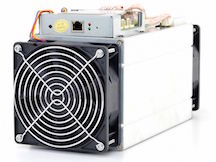
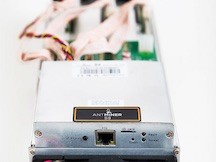
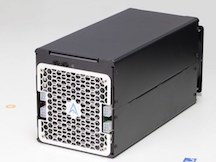

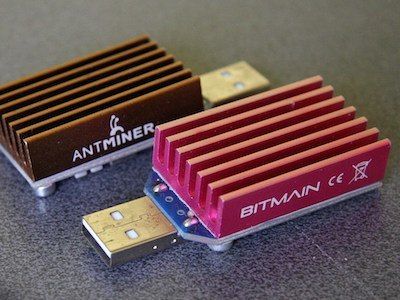
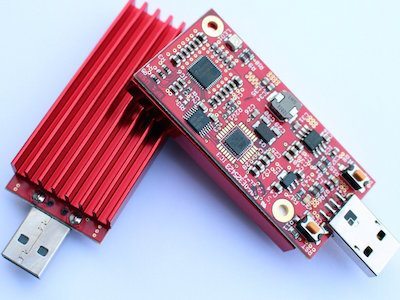
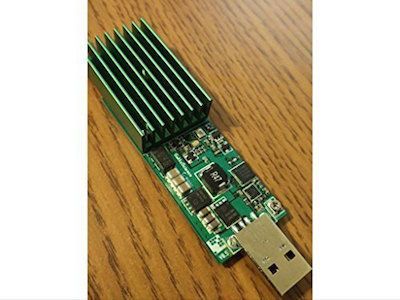
No comments:
Post a Comment